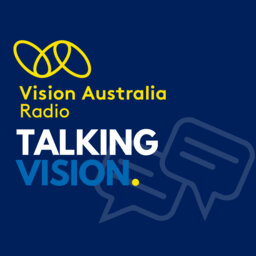Talking Vision 754 Week Beginning 11th of November 2024
Sam caught up a while back with blind endurance runner, motivational speaker and all around thrill seeker Ben Pettingill, whose aim for 2024 is to run 3,249km for mental health in a project he calls 3249 Blind.
You'll also hear from Liz who's back to tell us about the latest issue of For Your Information, and we hear from Blind Australian of the Year Award winner Courtney Webeck who spoke with Marie from Vision Australia in Brisbane following her award win.
In 1 playlist(s)
Talking Vision by Vision Australia Radio
Vision Australia Radiothon is on now. Donate via www.varadio.org and make a tax deductible donation …Social links
Follow podcast
Recent clips

Talking Vision 819 Week Beginning 16th of February 2026
28:59

Talking Vision 818 Week Beginning 9th of February 2026
28:10

Talking Vision 817 Week Beginning 2nd of February 2026
27:37
 Talking Vision by Vision Australia Radio
Talking Vision by Vision Australia Radio